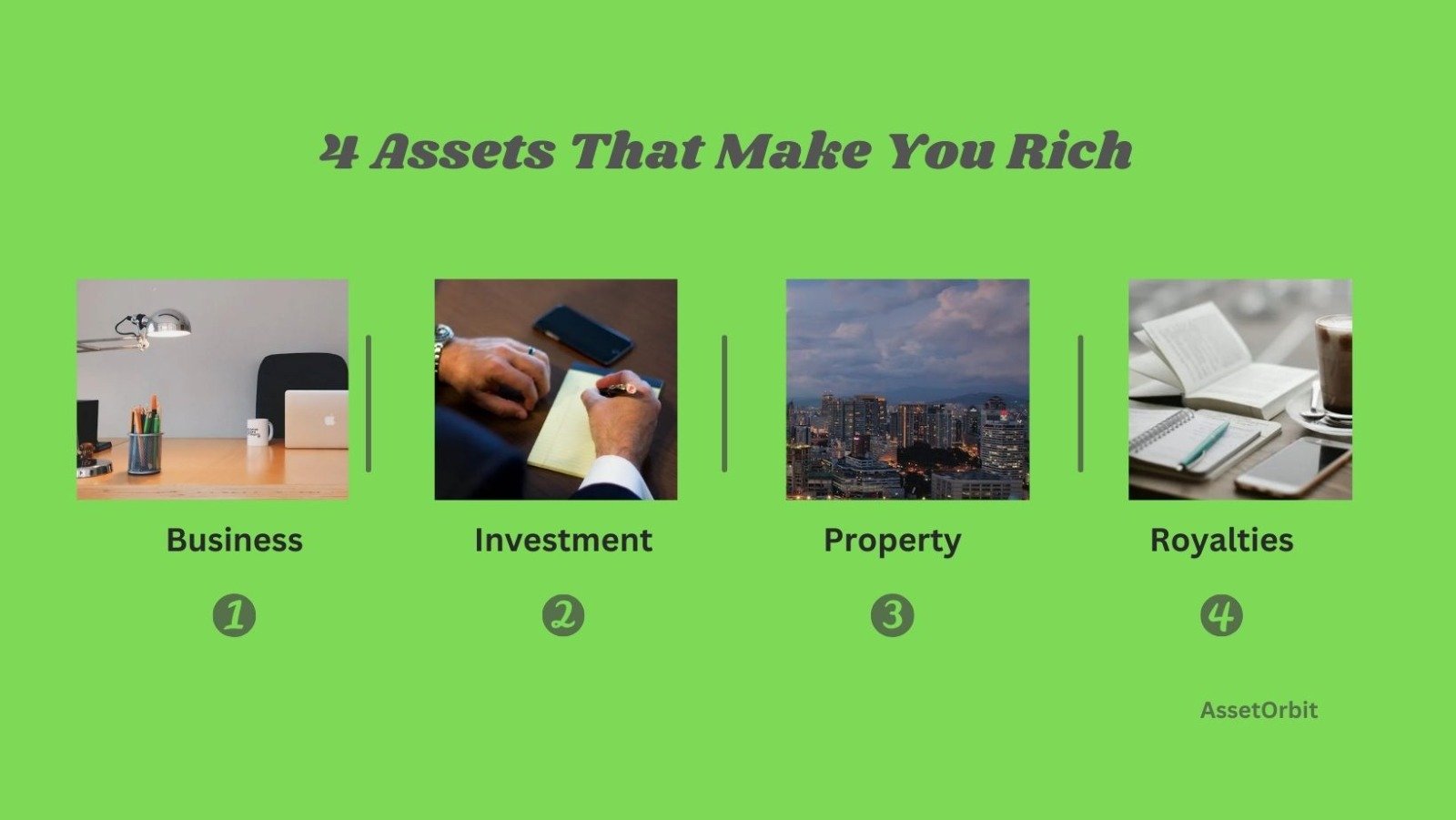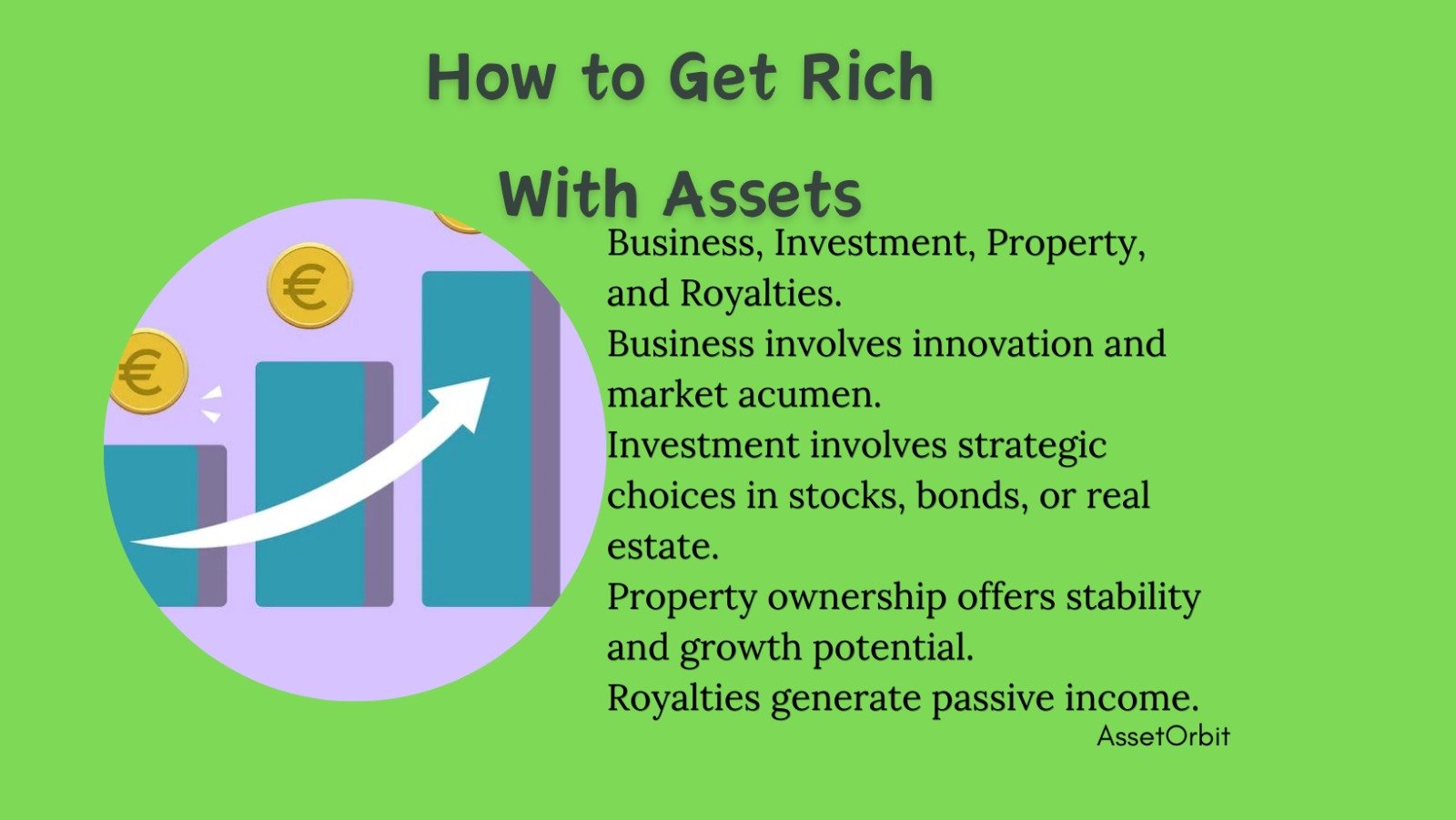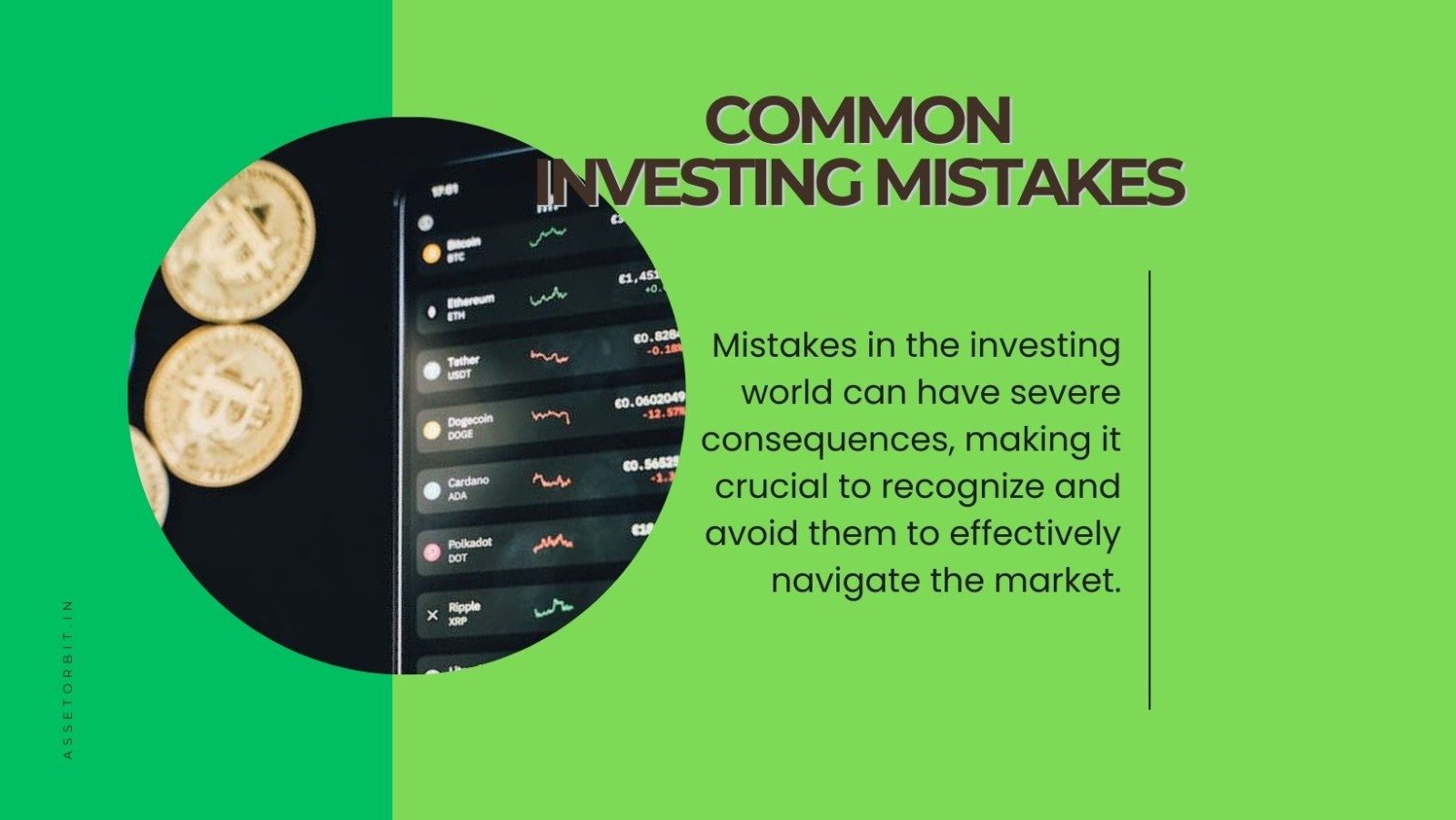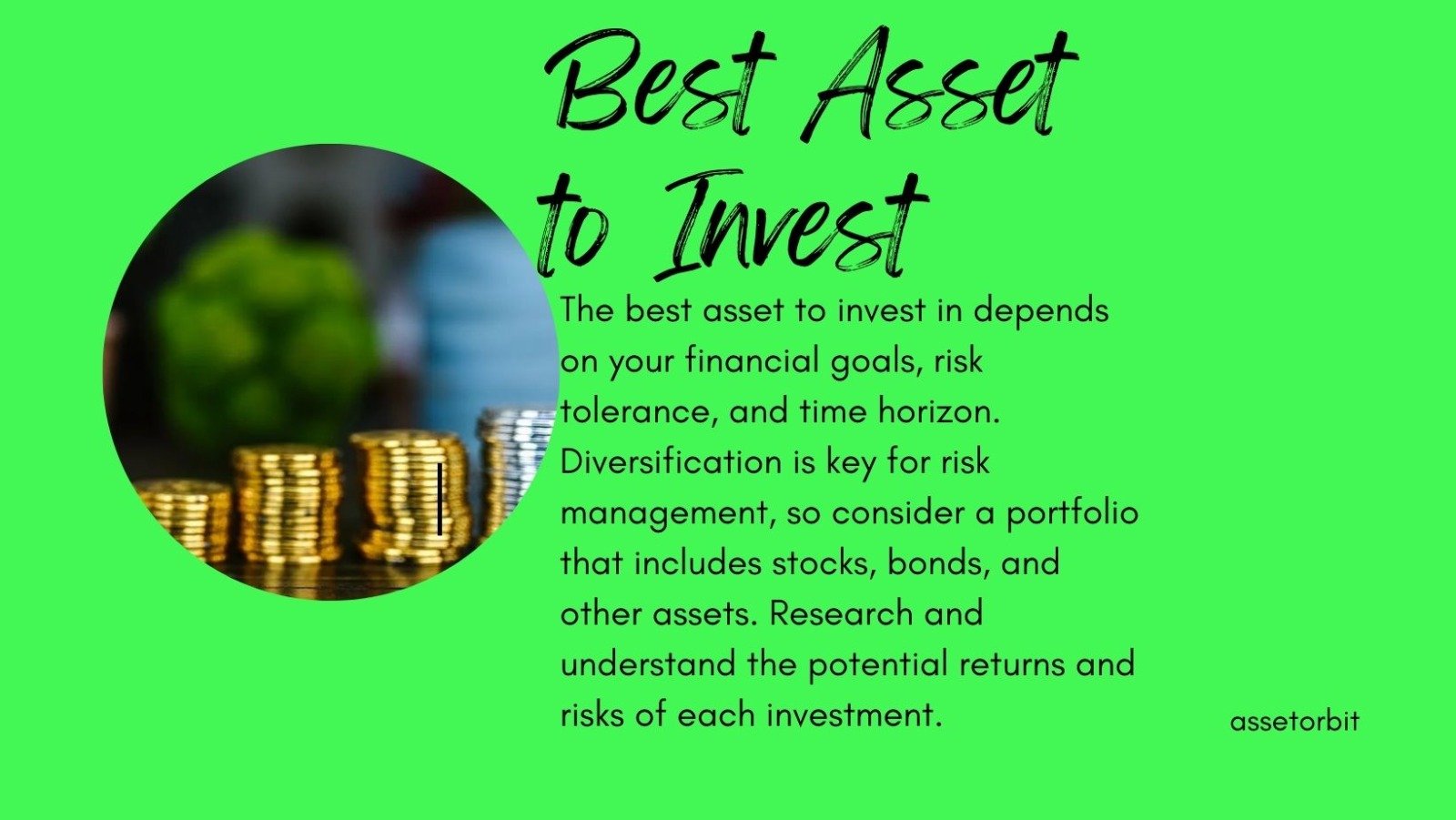Rich with assets
Wealth building involves mastering four key assets: business, investment, property, and royalties. Business involves innovation and market acumen, while investment involves strategic choices in stocks, bonds, or real estate. Property ownership offers stability and growth potential, while royalties generate passive income.
By mastering these assets, individuals can unlock the door to financial success and achieve their dream of becoming rich. This symphony of assets, including business, investment, property, and royalties, can help individuals achieve financial success and achieve their financial goals.
In short
4 assets that make you rich
Achieving financial freedom requires more than just saving money; it also necessitates investing in assets that may generate wealth gradually.
Business, investments, real estate, and royalties are the four main assets that may lead to wealth. Long-term success requires mastering them. Being an owner or partner in a business not only provides opportunities for active income generation, but also for wealth scaling through innovation and expansion.
A diverse portfolio and the potential to see your money grow over time are the results of smart investing in stocks, bonds, and mutual funds. When you have a solid investing plan in place, you’re not only trying to make money; you’re really building wealth.

Owning property is one of the foundations of wealth creation. Appreciation of real estate or other valuable physical assets may enhance their stability and potential for passive income.
Royalties, whether from creative works, patents, or other forms of intellectual property, may, in the end, offer a steady source of revenue without actively doing anything. While you publish a book, create a course, or come up with an invention, you may receive royalties and continue to earn money even when you’re not working.
By using these four assets, you are not only seeking short-term gains; rather, you are laying the groundwork for a future in which your wealth increases automatically. Strategic and consistent investment in these areas is a way to accumulate wealth.
1. Business
Businesses provide entrepreneurs with a significant tool for building wealth: the opportunity to generate scalable revenue and attain financial independence. When you establish a solid foundation for your business through innovation and expansion, you not only make money, but you also create value in the long run.
Why Owning a Business is the Key to Getting Rich
| Figure | Insight | Source |
|---|---|---|
| 88% of millionaires are self-made, with a significant portion owning businesses. | Most millionaires generate their wealth through business ownership rather than inheritance. | Wealth-X, 2019 Wealth Report |
| In 2022, there were 33.2 million small businesses in the United States. | Small businesses significantly contribute to job creation and economic growth. | U.S. Small Business Administration (SBA) |
| In 2021, entrepreneurial endeavors produced half of the world's billionaires. | Businesses are the primary source of wealth for most billionaires. | Forbes, World’s Billionaires List 2021 |
Possibilities
1. Income Potential:
A successful business can generate substantial income streams, affecting both startups and larger enterprises, as the earning potential is directly linked to the value the business brings to the market.
2. Wealth Accumulation:
As a business grows and becomes profitable, individuals can accumulate significant wealth, which can appreciate over time beyond immediate earnings.
Business Ownership Benefits:
- Provides control and flexibility over decision-making.
- Allows entrepreneurs to adapt to market changes and capitalize on opportunities.
- Facilitates wealth diversification, spreading financial risk across various income streams.
- Successful entrepreneurs often engage in multiple ventures.
Business Ownership Cons:
- Risk and Uncertainty: Entrepreneurs must navigate economic downturns, consumer preferences, and industry disruptions.
- Time and Effort: Successful business building requires significant time and effort, especially during initial stages.
Elon Musk and Steve Jobs gained enormous wealth through the IT business. Companies such as Tesla and Apple demonstrate the possibility of significant financial success by developing innovative goods that fulfill market demands. Local entrepreneurs that start successful small enterprises, such as restaurants, retail stores, or service providers, can make money by catering to the requirements of local communities.
2. Investment
Strategic investment is a powerful tool for financial prosperity, propelling individuals towards wealth. This exploration explores investments like stocks, gold, mutual funds, and bonds, highlighting their possibilities, advantages, disadvantages, and examples. It provides examples to illustrate the transformative role of investments in the pursuit of riches.
How Smart Investments Can Build Lasting Wealth
| Figure | Insight | Source |
|---|---|---|
| Over the past century, the average annual return on the stock market has been around 10%. | Long-term stock market investments consistently provide strong returns. | S&P Global, Historical Data on Stock Returns |
| The majority of millionaires(85%) invest in stocks, bonds, and other securities. | Wealthy people rely heavily on investments to grow their fortunes. | The Millionaire Next Door, Thomas J. Stanley |
| In 1990, investing $1,000 in the S&P 500 would yield a return of over $19,000 in 2022. | Long-term investments, particularly in diversified indexes, consistently yield substantial returns over time. | Bankrate, S&P 500 Growth Analysis |
Possibilities
1. Capital Appreciation:
Capital appreciation refers to the growth in value of investments over time, such as the soaring value of stocks or the long-term appreciation of gold, which can significantly increase one’s wealth.
2. Passive Income:
Dividend-paying stocks or interest-bearing bonds provide a steady stream of passive income, enhancing financial stability and facilitating wealth accumulation.
Pros of Investments:
- Diversification of Assets: Spreads risk across different classes, protecting against potential volatility.
- Access to Global Markets: Provides diverse opportunities in international stocks and gold markets. Offers wealth creation beyond local economic conditions.
Investment Cons:
- Market Volatility: Investments are subject to market fluctuations, requiring risk management strategies.
- Economic Uncertainty: Economic factors like inflation or recession can affect investment performance. Understanding and adapting to broader trends is crucial for successful wealth accumulation.
Warren Buffett‘s success in the stock market is attributed to strategic investments, careful stock selection, long-term perspective, and market dynamics understanding.
Gold, historically a safe-haven asset and inflation hedge, offers stability to investors who strategically allocate a portion of their portfolio to gold during economic uncertainty.
3. Property
Property is a powerful asset that can secure one’s future and lead to riches. It can be utilized through renting, reselling, or other strategies, highlighting its transformative role in the pursuit of wealth. This exploration explores the possibilities, advantages, disadvantages, and examples to highlight the transformative role of property in the quest for wealth.
How Real Estate Investments Can Make You Rich
| Figure | Insight | Source |
|---|---|---|
| 90% of the world's millionaires have been generated through real estate investments. | Real estate is a proven method for wealth creation. | The College Investor, Real Estate Millionaires |
| Real estate investors typically achieve an annual ROI of 8–12%. | Real estate provides high returns, often surpassing inflation. | Roofstock, Real Estate ROI Data |
| Rental properties typically yield a 5–10% annual cash-on-cash return. | Rental income provides a steady source of income, making it an attractive investment option. | BiggerPockets, Rental Property ROI Statistics |
Possibilities
1. Rental Income:
Owning rental properties offers a steady income stream through tenant payments, with successful property management, strategic location selection, and market demand understanding contributing to lucrative returns.
2. Capital Appreciation:
Property values can appreciate over time, providing potential capital gains, especially in high-demand or economic-growth real estate markets.
Property Investment Pros:
• Stability and Tangibility: Property ownership provides a tangible, stable asset. It can withstand market volatility, providing long-term financial stability.
• Leverage and Financing: Property investment allows for leveraging, using borrowed funds to increase the potential return. Mortgages and other financing options enable entry with a fraction of the total property value.
Property Investment Cons:
• Significant upfront costs: down payments, closing costs, and ongoing maintenance expenses.
• Market Sensitivity: Property values are influenced by market conditions and economic factors. Fluctuations in real estate markets can affect property value.
Successful real estate entrepreneurs like Donald Trump and Barbara Corcoran have achieved significant wealth through buying, developing, and selling properties, showcasing the importance of strategic property management and investment in achieving financial success.
Individuals can achieve financial success by strategically building a portfolio of rental properties, focusing on careful property selection, effective management, and understanding local market dynamics for consistent rental income.
4. Royalties
In the pursuit of financial abundance, royalties emerge as a distinct and powerful asset with the ability to transport individuals into a realm of sustainable affluence. In this investigation of how royalties derived from products such as e-books, Kindle, and online courses can be a key player in the journey to riches, we’ll delve into the possibilities, benefits, and drawbacks, as well as provide examples to highlight the transformative role of royalties as an asset in the quest for prosperity.
How Intellectual Property Can Create Passive Income
| Figure | Insight | Source |
|---|---|---|
| The annual value of the global royalty market is over $40 billion. | Royalties are a significant source of revenue across various industries. | Music Business Worldwide, 2022 Royalty Market |
| The global patent licensing market had a value of $150 billion in 2021. | Intellectual property, including patents, significantly generates royalty income. | Statista, Global Patent Market |
| Each sold book entitles authors to a royalty of 10-15%. | Book royalties provide substantial returns, particularly for bestselling authors. | Writer’s Digest, Book Royalty Data |
Possibilities
1. Passive Income Streams:
Royalties provide creators with a unique method to generate passive income, providing ongoing financial returns after the initial investment in e-books, Kindle publications, or online courses.
2. Scalability:
Royalties enable creators to expand their global audience through digital products like e-books or online courses, allowing them to increase their income without requiring a significant increase in effort.
Pros of Royalty-generating Products:
- Provides creative freedom: Allows creators to express expertise and passion while building wealth.
- Potential for long-term income: Royalties can result in sustained wealth accumulation. Successful products with evergreen content can continue to generate revenue.
Cons of Royalty-generating Products:
- Initial Effort and Investment: Requires significant upfront effort and investment.
- Market Competition: Navigating a crowded market for digital products and online courses requires effective marketing strategies.
Best-selling authors like J K Rowling and Stephen King have significantly earned wealth through e-book royalties, which continue to generate income through digital sales and licensing agreements, showcasing the long-term potential of royalties.
Entrepreneurs like Marie Forleo and Neil Patel have created successful online courses that significantly contribute to their wealth, covering topics like business, marketing, and personal development, demonstrating how expertise can be monetized through royalties.
Final thoughts
The pursuit of wealth through strategic asset accumulation offers a roadmap to financial success. The four key assets—business, investment, property, and royalties—open doors to prosperity. Business offers substantial income and entrepreneurial success; investment mirrors entrepreneurship principles; property provides stability, rental income, and capital appreciation; and royalties from creative endeavors offer passive income and long-term wealth. Success lies in strategic planning, adaptability, and understanding market forces. Integrating these assets into one’s financial portfolio can transform lives and secure a path to enduring wealth. The key to getting rich is not just in possession of assets but in strategic and informed utilization of these powerful tools.
FAQs
Which is the most safest asset?
Government bonds, certificates of deposit, and savings accounts are considered safer due to their lower risk of default. Precious metals like gold are also considered safe assets during economic uncertainty. However, no investment is entirely risk-free, and diversification is often recommended to mitigate risks in a well-balanced portfolio. It is crucial to seek professional financial advice tailored to your specific situation when making investment decisions.
How do I start investing in poor?
Starting to invest with limited financial resources can be challenging, but it's not impossible. To begin, set financial goals, create a budget, start small, explore low-cost investments, take advantage of employer-sponsored plans, educate yourself, consider micro-investing apps, and consider tax-advantaged accounts. Prioritize an emergency fund to cover unexpected expenses and avoid liquidating investments. Consistency is key, and make it a habit to contribute a small amount regularly. Over time, as your financial situation improves, you can increase your investment contributions. Seeking advice from a financial advisor can provide personalized guidance based on your specific circumstances. By following these steps, you can create a solid foundation for your investment journey.



